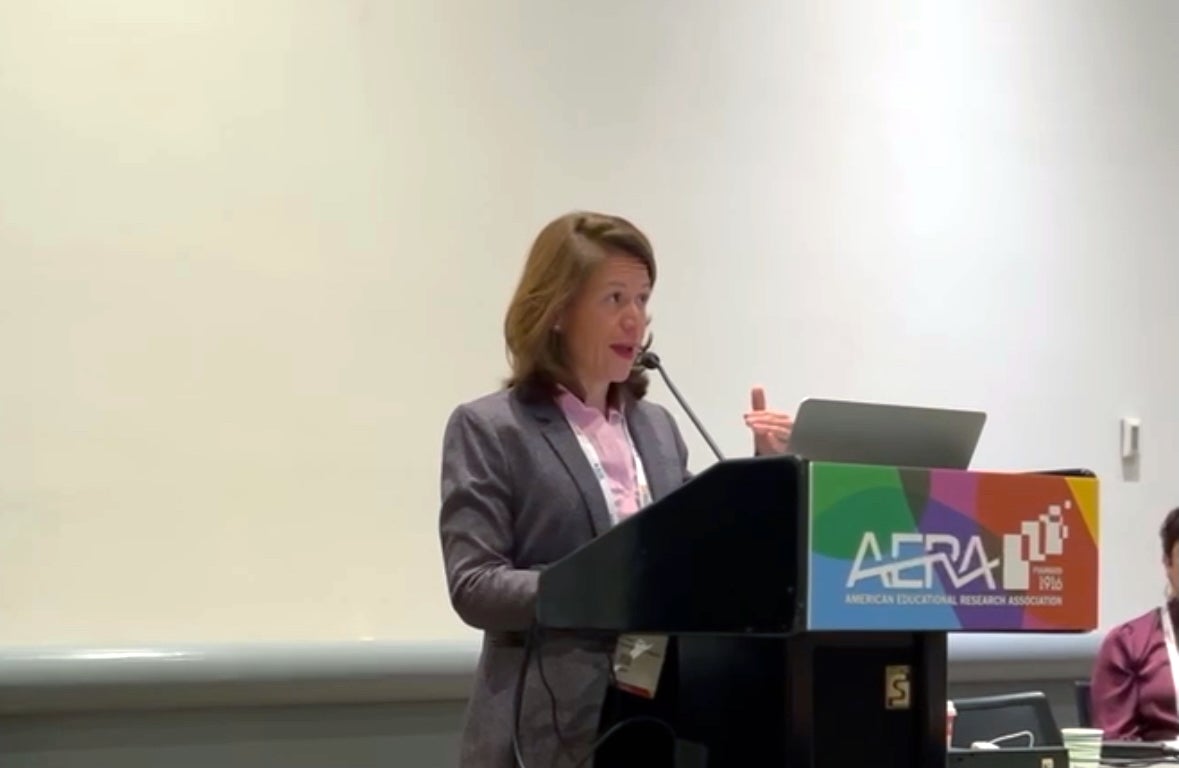A day-by-day summary of this year’s Annual Meeting, showcasing scholarship and expertise with presentations by UCLA Ed&IS students, faculty, and researchers.
Jump to summary for Wednesday, April 23 | Thursday, April 24 | Friday, April 25 | Saturday, April 26 | Sunday, April 27
Wednesday, April 23
During a session titled, “The Dynamics of Philanthropy: Racialization, Representation, and Research Equity,” doctoral student Abbie Cohen presented her paper, “A Spectacle by Design: A Racialized Performance for Donor Dollars,” providing an exploration of philanthropy in education through a lens of racialized power, knowledge infrastructure, representation theory, and educational innovation. Using critical ethnography, Cohen showed how community-based nonprofits navigate relationships with private donors, revealing the performative nature of securing funding in the current sociopolitical context.
Professor of Education Sylvia Hurtado and doctoral students Marcelo Alonso and Gabriel Gutierrez Aragon presented their study, “Racial Climate Assessments: Ends or Means for Institutional Action,” during a roundtable session on, “Race and Racism in Higher Education.” Their findings show how campuses use racial climate data, tracking progress, identifying in-action, or changing educational environments for marginalized racial identity groups, using a sequential mixed-methods approach.
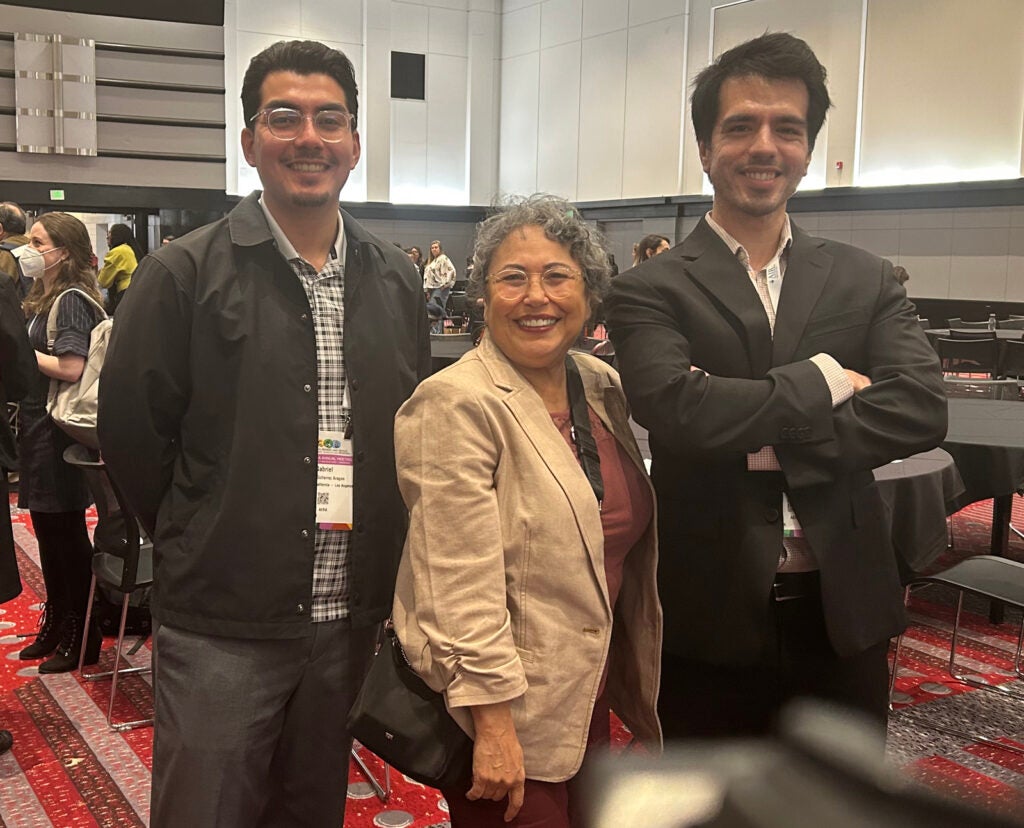
The team’s data was collected from a national sample of institutions featuring DEIJ administrators and institutional researchers’ perspectives, emphasizing the importance of intentional data use for organizational learning and change in areas such as planning, faculty development, and student services. Their discussion shared the goal to understand how climate assessments can foster institutional change and identify best practices, as well as areas for further development. In addition, the researchers discussed the future of DEI and racial climate assessment.
Janene Ward, co-director of the LAUSD CGI Action Research Project, part of the UCLA Mathematics Project at Center X, and doctoral student Adejah Taylor presented “Designing Classroom Observation Measures to Support Teacher Learning and Instructional Practice in Mathematics” in a roundtable session on “Studies of Instructional Practices in Mathematics.” Their study addressed the challenges of producing observation data that will better support teachers in the learning about their students and their own instruction, and promote teacher thinking about potential changes, and is significantly linked to student learning outcomes.
Taylor and Ward’s paper describes the design of a real-time mathematics classroom observation measure that provides detailed information about student participation to support teacher learning and improvement of practice, and reports on the implementation of the measure in 26 classrooms in seven elementary schools.
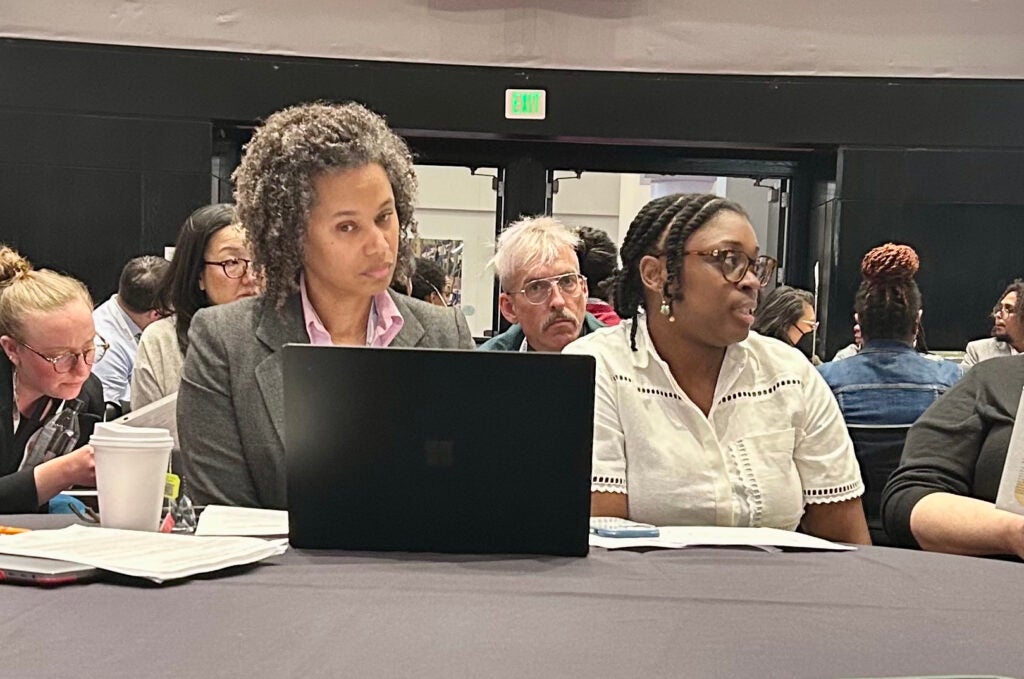
Center X researchers Imelda Nava-Landeros, Jane Kim, Deborah M. LaTorre, and Maria Paz-Fernandez put a strong wrap on the day in a structured poster session titled, “Formative Research and Pedagogical Approaches to Integrate Computational Thinking and Computer Science in a Residency,” exploring their research on computational thinking and equity in computer science, with Jean Ryoo, director of research of the Computer Science Equity Project at Center X, serving as discussant.
“Computational thinking for equity allows us to create a pathway forward,” said Nava-Landeros, UCLA STEM+C3 director and STEM Teacher Education faculty member in the UCLA Teacher Education Program.“It explains and provides a road map, a way to engage in critical thinking. In our research, we wanted to assure that we engage the community, that we help our teachers think about how this work impacts the world around them, the community, and themselves. Because of that, we framed our computational thinking practices in equity issues, in dialogue and collaboration, and in real world data.”
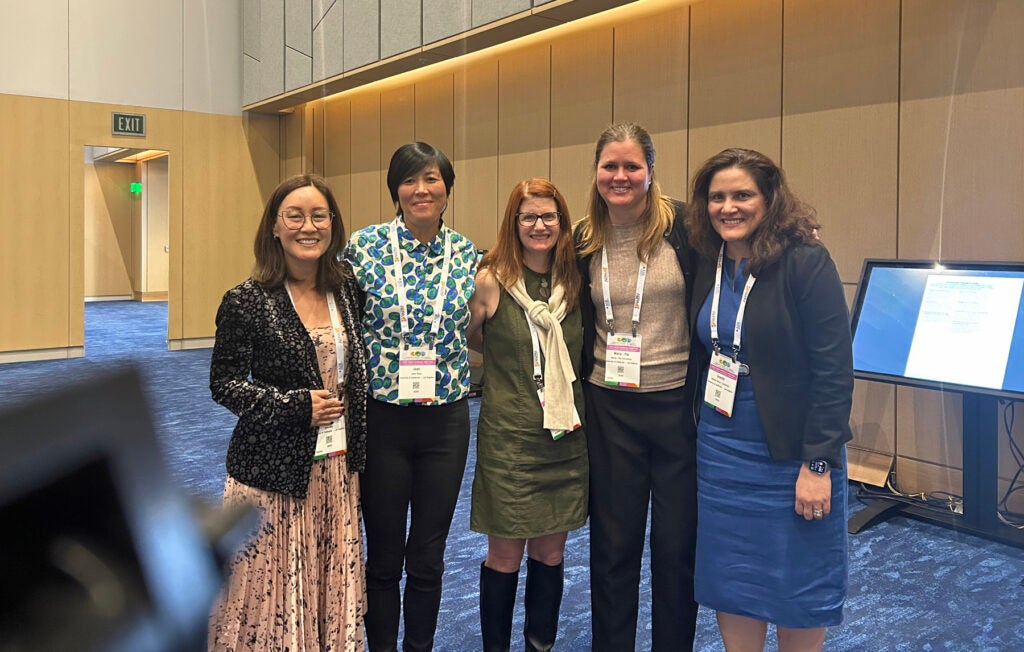
Thursday, April 24
Jump to summary for Wednesday, April 23 | Thursday, April 24 | Friday, April 25 | Saturday, April 26 | Sunday, April 27
Michelle Choi, associate director of the Computer Science Equity Project (CSEP) at Center X, presented “Critical Perspectives on AI: Young Women and Non-Binary Students’ Voices from Girls Who Code,” during a symposium titled, “Voices of Change: Black and Latine Students’ Perspectives on Equitable Computer Science Education.” The study, conducted with UCLA’s Jean Ryoo, CSEP director of research, and doctoral student Wei Wei, as well as researchers from the nonprofit, Girls Who Code, revealed the concerns of K-12 students across California around generative AI and its role in their education.
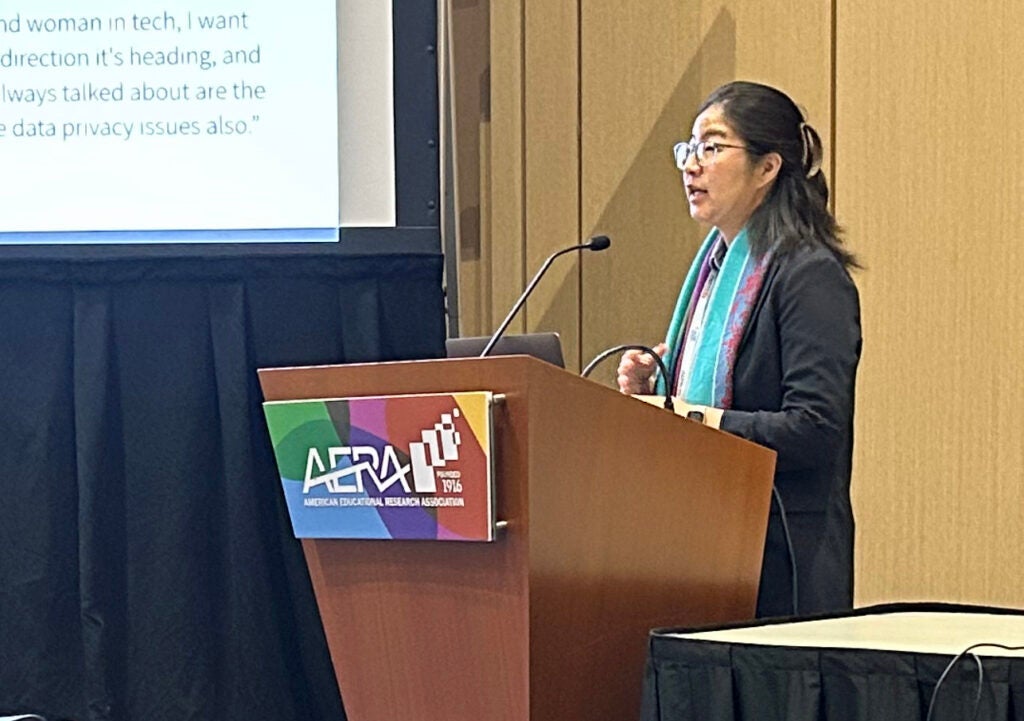
“We were able to interview 25 students from across California who had participated in a summer program that Girls Who Code hosted, and talk about all the different ways that students are thinking about AI; positively, negatively, and [neutrally] … what they’re thinking about the ethical implications of AI and how they think AI might be affecting their futures, their careers, and the world at large,” said Choi.
“Students really care about technology and … want to learn more about computer science and technology and the good and bad of it,” she said. “They want more of those types of experiences in their school experience and K-12 learning. If there are ways we can find to integrate more computer science education across the K-12 journey for children, I think they can really benefit from them, and they say that they want it.”
Tim Herd, a 4th-year PhD candidate and Wasserman Fellow in the Higher Education & Organizational Change (HEOC) division, shared his paper, “The Time Is Now: White Suburban School District Response to Diversity, Equity, Inclusion, and Anti-Blackness,” during a roundtable session on “Culture, Diversity, and Climate.” His study examined a majority-white suburb and its school board to learn how they developed and implemented DEI policies that address anti-Blackness, while also identifying their responses to critical race theory, in the wake of the murder of George Floyd, the COVID-19 pandemic, and the Black Lives Matter movement.
“One of the things that was really big was this idea of culture, and they would talk … about how that school board in particular was the most cohesive school board that they had had, in the midst of all the chaos, which was surprising to me,” said Herd. “One of the biggest themes from the three school board members who I interviewed was this idea of putting the students first and providing quality education, because this school district in particular was one of the wealthier school districts in the state, and it’s also one of the more academically rigorous in terms of the percentage of students who go to flagship institutions within that state.”
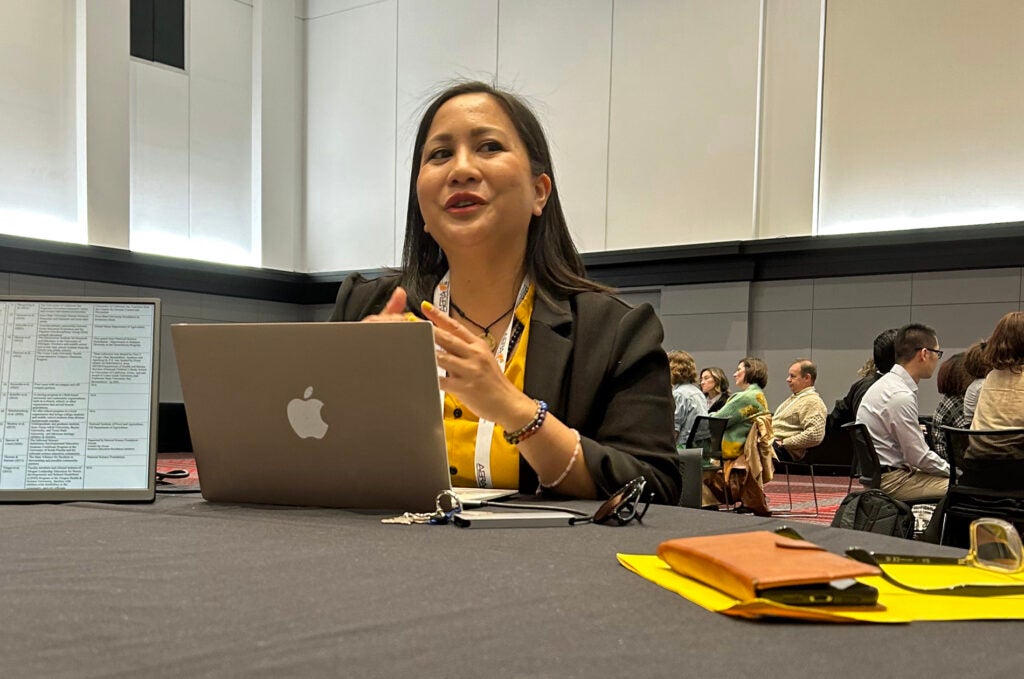
“There was this kind of … disposition of optimism, of how … to use this model … of cohesion in this time of chaos, and potentially be a model for other suburban school districts, and in particular, other majority white suburban school districts across the country. They also talked about the opportunity that came from just being able to have conversations about this.”
Doctoral student Christine Abagat Liboon shared her paper, “A Review of STEM Community Praxis: Toward Social Justice–Based Program Evaluation in Education,” in a roundtable on “Exploring Research Studies on Experiential Education and Student Survey on Community-Based Courses.” Liboon’s paper, which she wrote with co-authors Jason Dorio, UCLA associate director of Undergraduate Programs for Community Engagement; and Bilgehan Ayik of George Mason University, revealed their findings on on STEM-based community-engaged programs that exist to center marginalized and minoritized youth using social justice transformative frameworks and social justice-oriented curriculum, and discussed frameworks that could act as restorative towards practices in university STEM-based community engaged programs.
Natalie Fensterstock, a doctoral student of social welfare in the UCLA Luskin School of Public Affairs and UCLA Ed&IS alumna, presented her work on, “Violence and Safety in Schools: Social workers report on the biggest threats and needs,” during the symposium titled, “The Perils of Educating: A National Sample of School Personnel Perceptions of School Violence.”
Fensterstock’s paper, co-written with UCLA Professor of Social Work and Education Ron Avi Astor, and Kate R. Watson, Vista Del Mar Child & Family Services, examined how school social workers perceive and experience school safety and violence, highlighting data-driven reflections and suggestions on how to improve school safety from the school social worker lens, offering suggestions for preventing and mitigating school violence at the local, state, and federal levels.
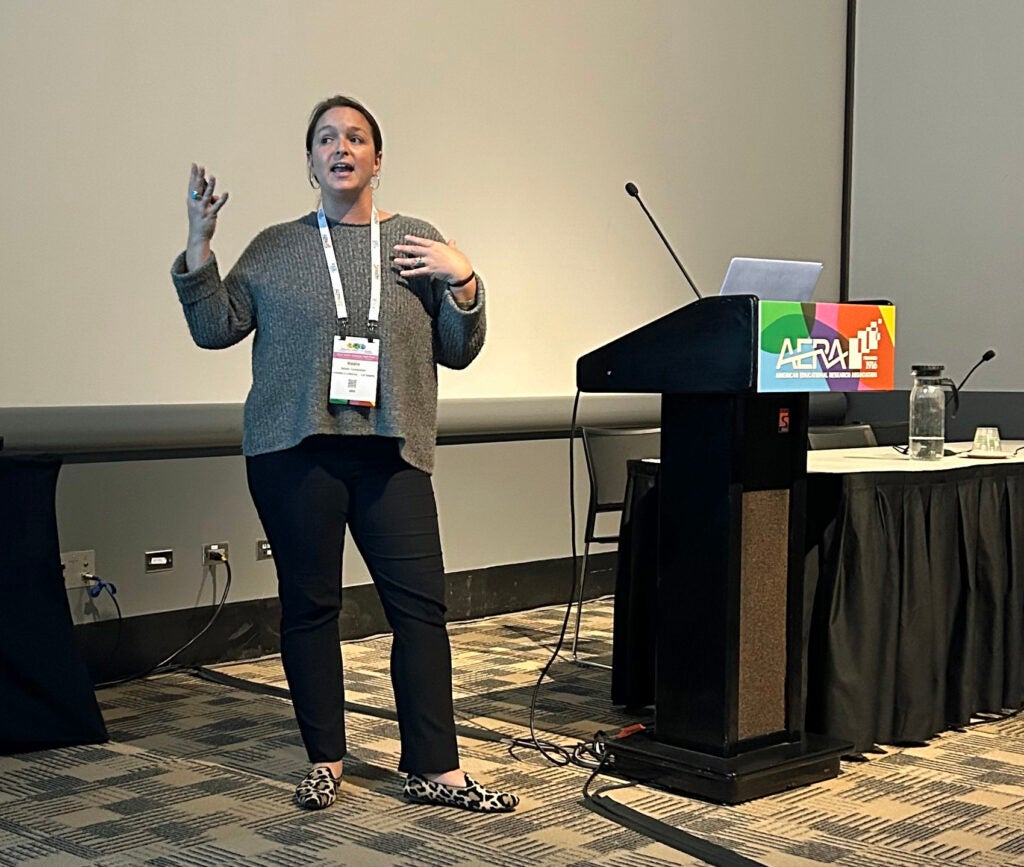
Professor of Education Tyrone Howard, past AERA President, and Professor of Education Lori Patton Davis, Heyman Endowed Chair and faculty director of the UCLA Educational Leadership Program, shared their papers during a Vice Presidential Session titled, “Brown vs. Board of Education@70: Centering Blackness in the Brown Decision (1954 to the Present), a Candid Conversation.” The session focused on centering Blackness through an exploration of the 70th Anniversary of the 1954 Brown vs. Board of Education decision, inviting multiple versions of centering Blackness stands “enough,” “able,” and “significant” in the discourse.
Professor Patton Davis discussed, “Towards an Afrofuturist Perspective on the Black Women and Girls of Brown,” using a “centering approach” to illuminate the voices and contributions of Black women and girls, while offering an Afrofuturist reimagining of Brown, looking at investment in the educational success of Black women and girls; the possibilities to be realized when Black women and girls have full access to educational resources; and how re-narrativizing through the lens of Black women and girls would lead to the fulfillment and promise of Brown.
Patton Davis referenced her 2021 AERA Brown Lecture in Educational Research, noting that women were the majority of plaintiffs in Brown vs. Board; that the contributions of Black women and girls have still not been rightfully centered in the discourse on Brown; and how women shaped the movement for educational equity.
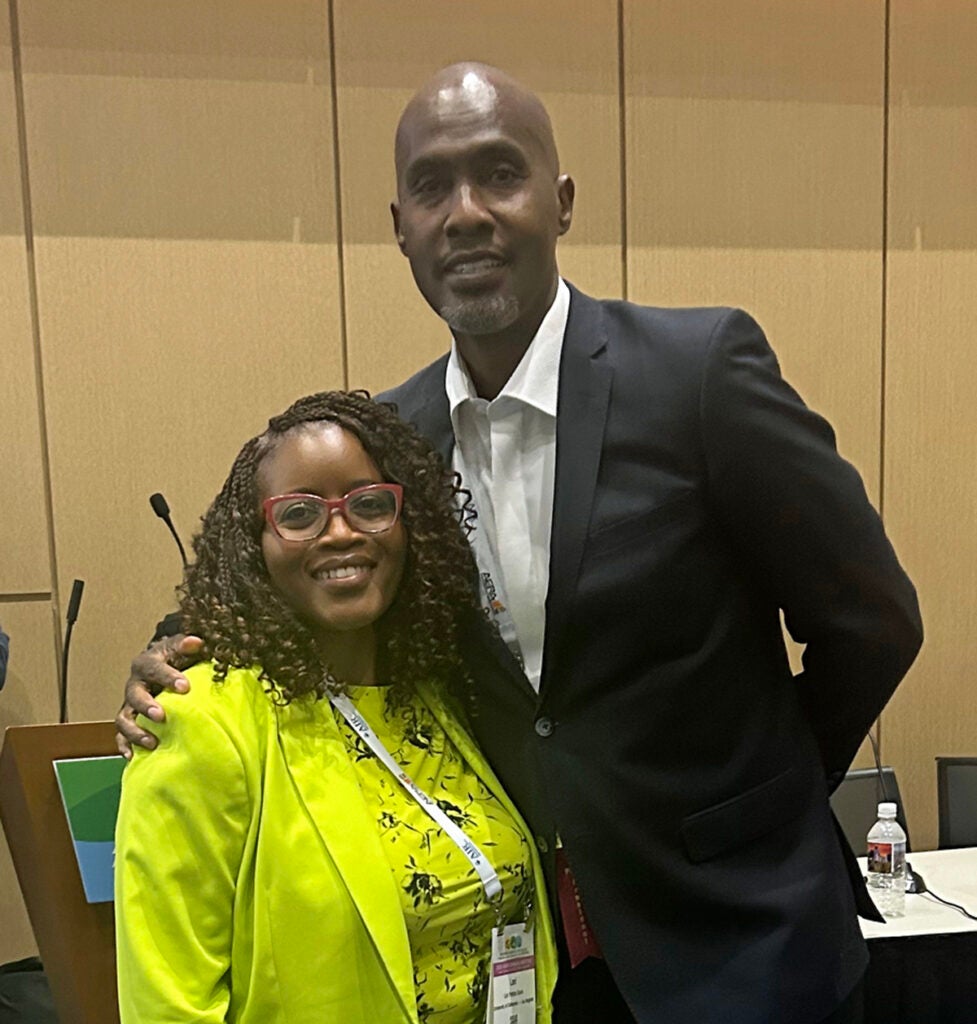
“We can… draw parallels between Black women’s resistance during the Brown era and our present-day circumstances,” said Professor Patton Davis. “For example, 70 years ago, Black women showed up, and although situated in the background, were integral to pushing the Brown decision forward.
“Today, 92 percent of Black women showed up to the polls, to exercise their right to vote and preserve our democracy, a democracy we haven’t yet fully realized, and we continue to be major facilitators of … legal and social change, whether it be raising attention to the push-out that Black girls are facing in the schools, challenging curriculum, or fighting anti-Black policies, such as hair discrimination in schools.”
Professor Howard shared his paper on, “What They Knew. What They Did. The pedagogies, politics, and practices of teachers Pre-Brown. Implications for Today’s Teachers.” Despite his acknowledgement that progress that there has been progress for many Black students since Brown, additional progress is needed, and examined the pedagogies, politics, and practices that were rooted in the teaching and learning.
The director of the UCLA Center for Transforming Schools and the UCLA Pritzker Center for Strengthening Children and Families, he highlighted a central and continuing issue that has pervaded since the historic ruling.
“You can change all the laws you want to but at the end of the day, you can’t legislate and undo people’s racism,” said Professor Howard.
Above: Tim Herd, PhD candidate and Wasserman Fellow in the Higher Education & Organizational Change division, shared his paper, “The Time Is Now: White Suburban School District Response to Diversity, Equity, Inclusion, and Anti-Blackness,” which examines a majority-white suburb and school board’s efforts to develop DEI policies. Photo by John McDonald
Friday, April 25
Jump to summary for Wednesday, April 23 | Thursday, April 24 | Friday, April 25 | Saturday, April 26 | Sunday, April 27
UCLA was well-represented in the symposium, “Becoming a Reader: Centering Students’ Experiences for Meaningful Literacy Research and Just Repair,” chaired by Nicole Mancevice, assistant professor-in-residence. Carol D. Lee from Northwestern University, served as discussant.
“This symposium brings together four studies to explore how young children understand and experience the work of learning to read in elementary school,” said Mancevice. “They all attend to the perspectives and experiences of elementary school students in relation to becoming and being readers. The papers illustrate why understanding students’ perspectives and experiences is essential to understanding their literacy development and outcomes.”
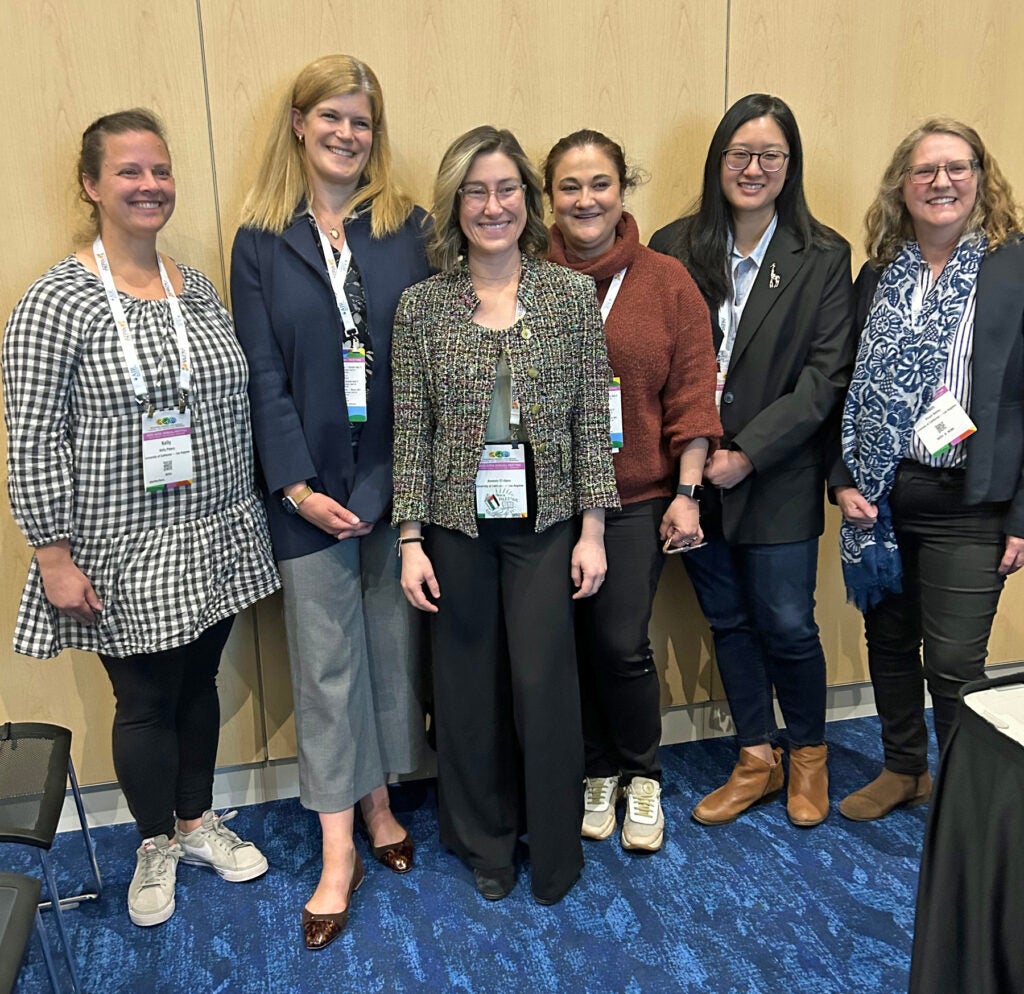
Doctoral student Amanda Giuliano and Mancevice presented their paper, “You Can’t Read Without Something to Read About”: Sociocultural Dimensions of Reading in Kindergarten.” Their research depicts a holistic picture of how students learn to read, guided by sociocultural theories of learning and literacy, during a school year in one kindergarten classroom. Their findings illustrate students’ knowledge of reading as a social and cultural activity, providing insights that can provide researchers and educators with a more complete understanding of how students become readers as they engage with instructional activities, classroom resources, and other people.
A second paper, “Becoming Readers with Wordless Books,” was presented by Christine Lee, project scientist, UCLA CONNECT; Kelly Erin Peters, demonstration teacher at UCLA Lab School; and doctoral student Amanda Harris. Their participatory research project examined how play can support children’s identities as storytellers in three kindergarten classrooms, making wordless books a part of regular “buddy reading” practice. Using qualitative methods, the researchers found that children felt empowered as readers by having agency in storytelling; that they recognized their experiences reading wordless books as a social activity; enjoyed reading or listening to others come up with different words while reading; and told stories from the same wordless book in various ways.
Professor of Education Inmaculada Maria Garcia Sánchez explored the role of peer talk and interaction in how K-1st grade children in an English-Spanish dual immersion classroom engage in the act of reading with, “And Then He Blew the House Down”: Peer Talk and Collaborative Reading in Early Literacy.” Her paper examined how through collaborative, interactional reading, children provide one another a powerful context for accessing and apprehending written texts, underscoring the importance of oral language and interaction to build a solid foundation for critical comprehension and diverse pathways to enter the world of reading, including those that the children themselves choose and organize.
Finally, Professor of Education Alison Bailey and PhD candidate Janet Cerda shared their work on, “Tracing the Development of and Motivations for Biliteracy with Multilingual Students Dually Designated as English Learners and Special Education Students.” Their paper looked at a study of students who are both classified as English learners and identified with a disability. The authors’ research revealed that these students are less likely to be reclassified than their EL peers due to reclassification policies focused on standardized test scores. Bailey and Cerda offered arguments for an expanded view of assessment with multilingual students that includes more frequent monitoring, using classroom-level indicators of growth, conceptualizing “continua of biliteracy,” and taking account of student voice and bilingual preferences, a more holistic approach to assessing multilingual students that could meaningfully trace progressions of biliteracy, with implications for assessment and instruction.
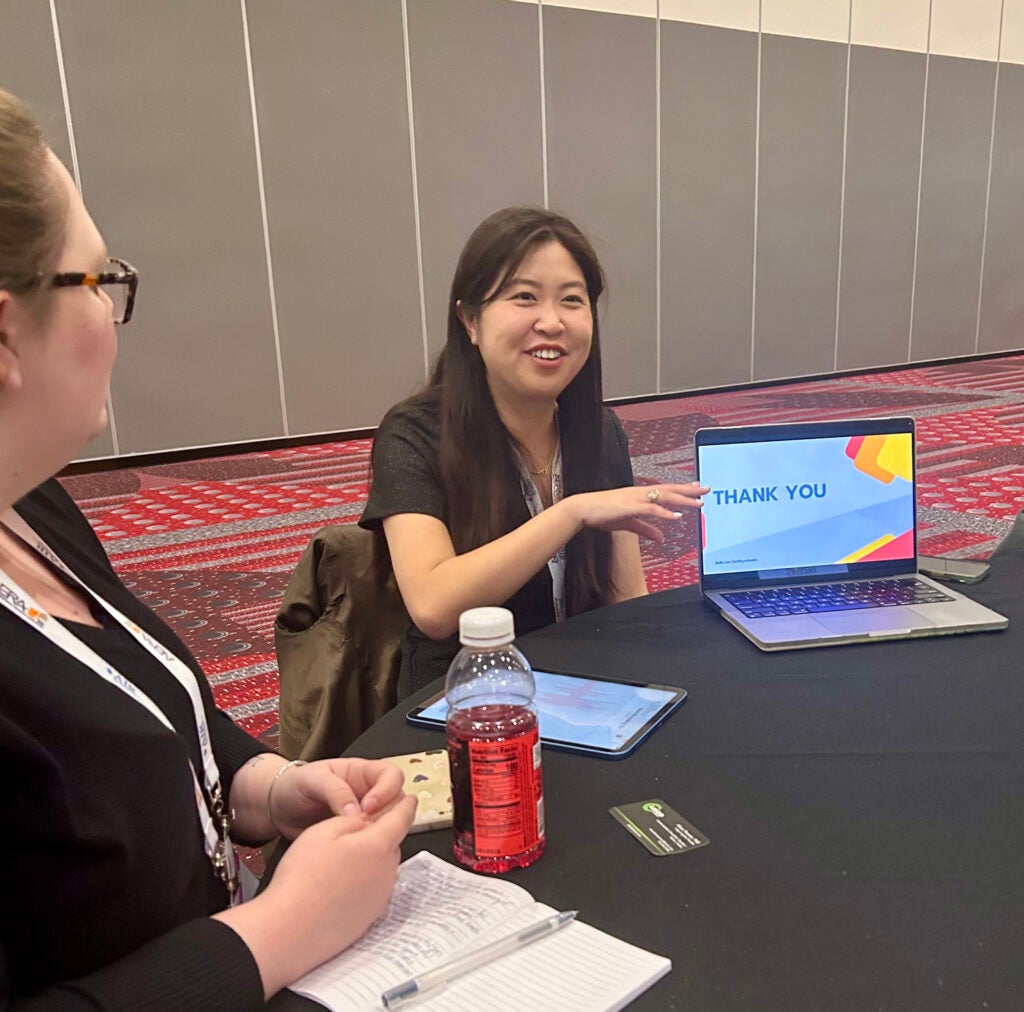
Belle Lee, a PhD student in the SEIS division of Higher Education & Organizational Change, presented, “Elevating First-Generation Asian American Voices: Racial Identity and College Experience,” in a roundtable session on, “Supporting Marginalized Identities in Higher Education.” Her study explores the experience of first-generation Asian American college students and how these students make sense of their college-going and racial identities.
Lee’s research shows how Asian Americans are under-researched in the literature on higher education and are misrepresented by the myth of the model minority. She also points out the great financial and social divides among diverse groups of Asian American students, with incorrect assumptions that they are all upper middle-class, with unimpeded access to higher education.
“When you look at first-generation Asian American student enrollment, while it has grown, when you disaggregate it by the different ethnicities, there are very mixed results,” Lee said. “Those factors really cloud the first -generation experience when you’re Asian American.
“Asian Americans are sometimes grouped together with white Americans, and in that grouping, they label them as [advantaged],” said Lee. “This not only flattens the nuance [of] first-gen status but takes away the impact of how your racialized experience impacts your sense of belonging, not just in higher ed but in first-generation spaces, because you’re already being pushed out as an [advantaged] group.”
Lee discussed Asian American students’ challenges around their identity because of these assumptions and underscored their resilience and determination.
“First-generation students who are Asian American have a very clear sense of their own motivations and how they present when they walk into the room, and I think that cannot be discounted in the literature,” she said. “We cannot conflate their experiences to all Asian Americans [or] to all first-generation students.”
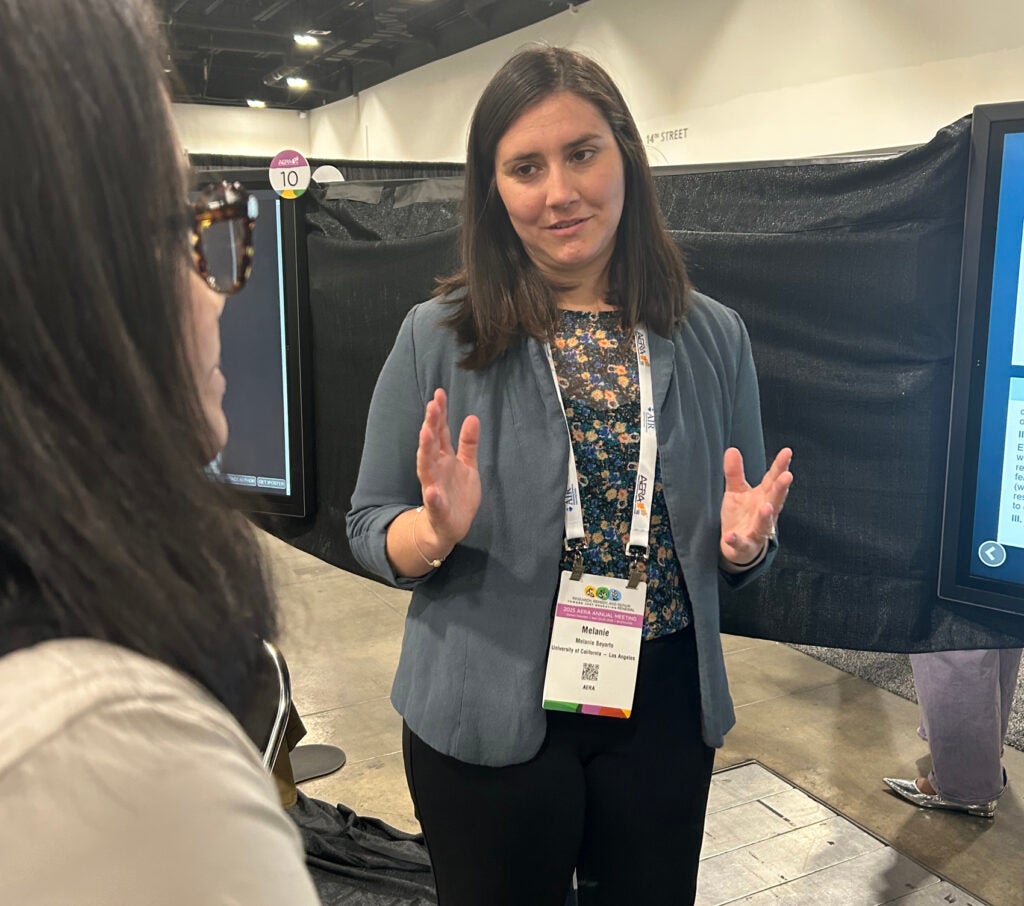
Doctoral student Melanie Seyarto spoke about her work in, “Connecting Head Start Teachers’ Well-Being to Children’s School Readiness,” in the invitational event, “AERA Promising Scholarship in Education Research: Dissertation Fellows and Their Research Poster Session.” Her research highlighted the fact that early educators are often paid low wages and experience challenges to their wellbeing, that are common even in the federal Head Start program, which is designed to support the school readiness of children from the lowest-income families. Using longitudinal, nationally representative data, Seyarto’s study asks whether teachers’ depressive symptoms and job satisfaction are associated with early cognitive outcomes that are essential to children’s later learning, including their executive function, math, literacy, and language skills.
“Educators, we know broadly, have very important roles in supporting children and families,” she said. “Their jobs are very demanding; they’re highly skilled teachers. Yet, they’re paid very, very low wages. This has raised a lot of concern in recent years… in research investigating both how this issue affects teachers and the children in their classrooms.
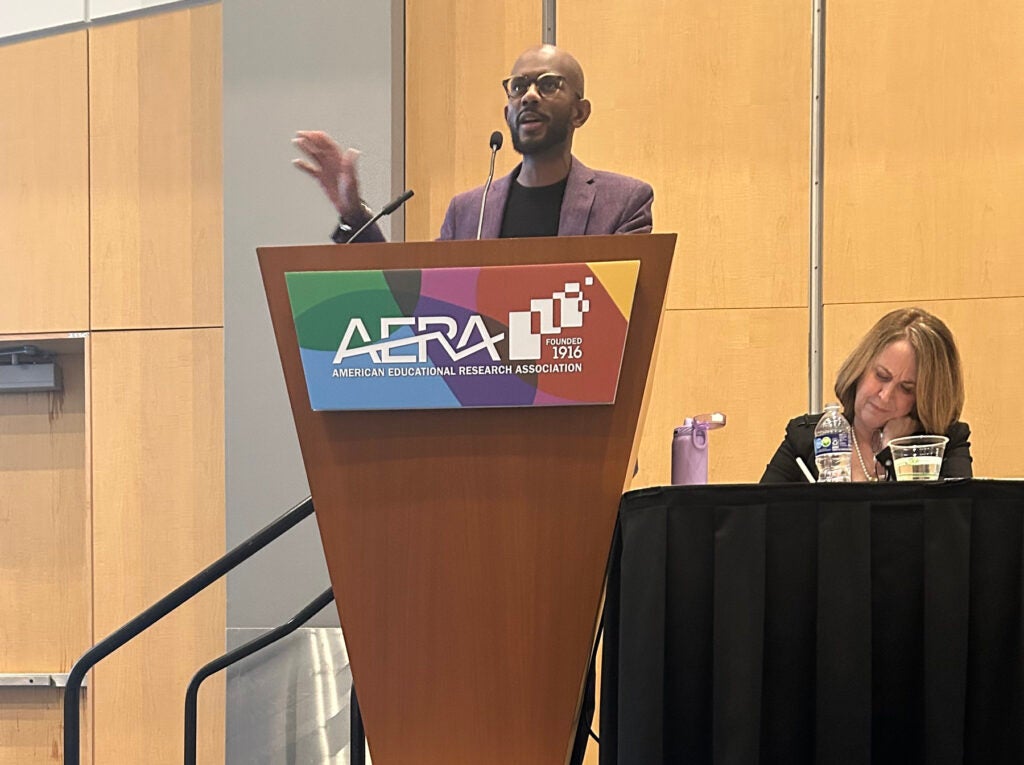
“It is really important to improve the policies and strategies, to support teachers and children in early education settings,” Seyarto said. “One really big takeaway [is the] wide gap between teacher’s compensation in Head Story and their credentials and experience. Head Start has taken steps to address teachers’ pay … and I would encourage policymakers to continue to work toward paying teachers a wage that corresponds to their education and experience.”
Professor of Education and History Eddie R. Cole spoke at an AERA Presidential Session titled, “Student Protests, Then and Now: Research on Free Speech, Social Movements, and Administrative Response in Education.” A historian of higher education, he delineated the research on student protests and movements, their consequences, and how universities respond to student activism.
“History matters, in the sense that while we’re facing challenges that flood headlines today, we have to remember that these challenges are not new,” said Professor Cole, who serves as the SEIS associate dean of equity, diversity, and inclusion. “‘Unprecedented’ is not really the word that captures where we are right now. There have often been times where state or federal governments have been suppressive toward what is happening on college campuses, so it’s important for us to know the past and take some lessons away from it.
“We have to think about in this present moment, what does organizing and coalition building look like? The past gives us examples for what that looks like, but we have to think, what does it mean to coordinate across unions? What does it mean for everyone to have free speech? What does it mean for us to really think about our organizational structures as campuses to really advance the mission of higher education for all students, and not let political interference stifle what we do?”
Cole asserts that institutions should, “… remember what we are focused on in terms of mission, academically; in terms of what others are working with; know that our challenge isn’t unique to us. One thing we can do is… talk to each other and start to think about how we approach our shared problems. We have to be proactive in finding people who have the shared idea of the value of higher education. When you think about student activism, there’s always a push around how we can make the campus experience better. Let’s think about other people on other campuses, that are also working toward that goal and how we can work with students, faculty, community members, and others who are really interested in doing this work together.”
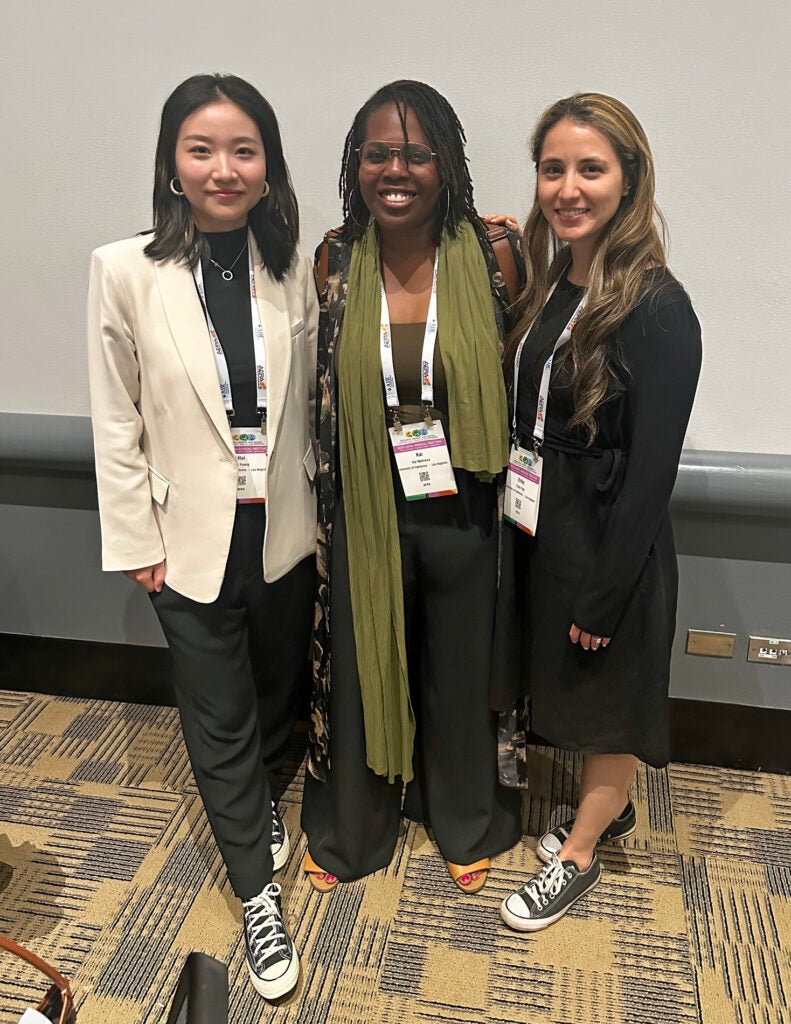
Kai Monet Mathews, former research director of the UCLA Center for the Transformation of Schools (CTS) and executive director of the Urban Ed Academy; and Hui Huang and Erika Yagi, doctoral candidates and CTS researchers, shared their research on, “Nooks and Crannies: How Community Colleges Can Contribute to California’s Educator Workforce” in a paper session on, “Addressing Challenges in Teacher Preparation: Exploring Internship Obstacles, Curriculum Perceptions, Inclusive Practices, and Community College Pathways.” Their study examines the potential of California Community Colleges (CCCs) to address the state’s teacher shortage by expanding their role in teacher preparation, as CCCs are currently limited in credentialing K-12 teachers in California. Analyzing the Cerritos College Teacher TRAC program, team’s research explores the feasibility and effectiveness of a community college-based model for preparing and credentialing teachers, and its potential to pave a more equitable and inclusive pathway to the profession.
Saturday, April 26
Jump to summary for Wednesday, April 23 | Thursday, April 24 | Friday, April 25 | Saturday, April 26 | Sunday, April 27
Marisa Saunders, associate director of research, and Jeffrey Yo, research associate, UCLA Center for Community Schooling, spoke on, “Addressing Teacher Shortages and Retention Through Community Schools: Power of In-service Mentorship and Peer Supports,” during a symposium on “Preparing Educators to Foster Strong Family-School-Community Partnerships in Community Schools.”
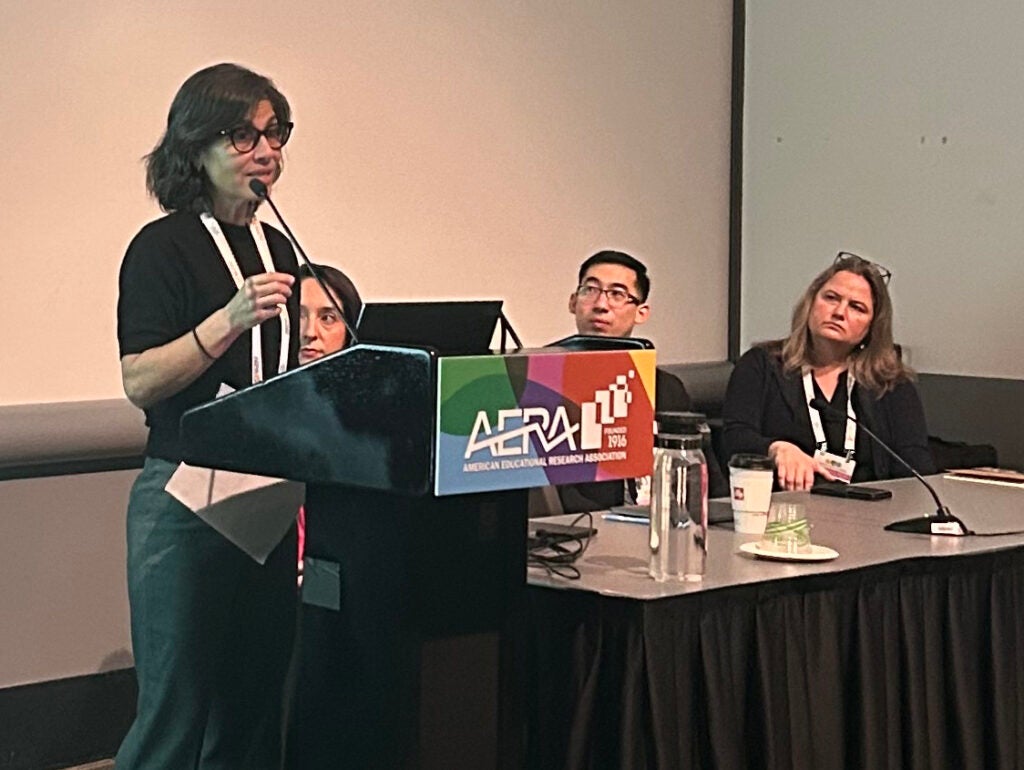
Saunders and Yo discussed the national teacher shortage, which was exacerbated by the COVID-19 pandemic that contributed to 55% of teachers deciding to leave the field sooner than expected. Their paper examined the potential of community schooling to encourage teachers to stay in the profession, as an environment that serves the whole child and redefines the role of teachers as activists and leaders within the school, who leverage their diverse backgrounds to connect with students and families. Community schools also strive to develop pedagogical alignment, allowing educators to experience the same learning methods they use with students, emphasizing sustained, collaborative efforts that enable educators to learn and practice new skills and strategies. The authors designed and implemented a mixed-methods study examining the experiences of BIPOC teachers in community schools, as well as teacher retention and satisfaction rates to understand how community schools can effectively address issues influencing attrition.
UCLA expertise was prominently shared during the invited roundtable titled, “The Handbook Education Policy Research Roundtable Session.” Professor of Education Anna Markowitz presented her findings on, “The Early Care and Education Workforce in the United States”; Teresa McCarty, Distinguished Professor and George F. Kellner Chair of Education and Anthropology, and international colleagues discussed, “Education Policy Research by, for, and With Indigenous Peoples in Canada, Mexico, and the United States.” In addition, Karen Hunter Quartz, director of the UCLA Center for Community Schooling, presented her work on “Community and Alternative School Policies.”
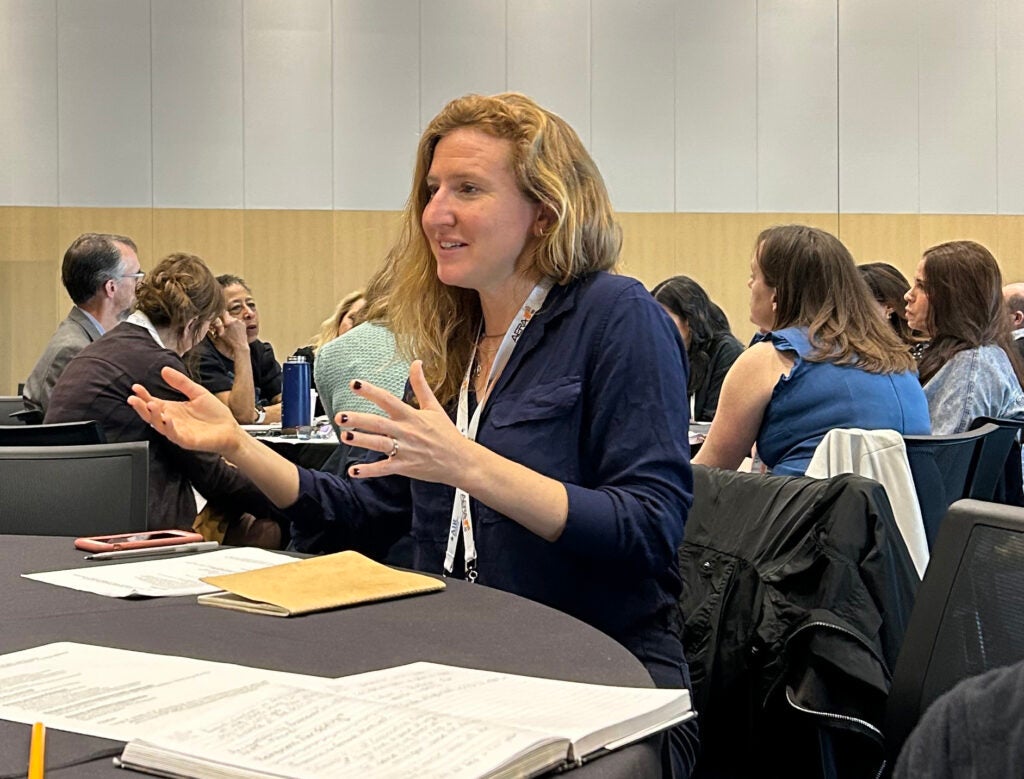
Professor Cecilia Rios-Aguilar, chair of the UCLA Department of Education, and doctoral students Elizabeth Sanchez and Daniela Amaya took part in an event, “’Conviviendo por y con Luis C. Moll’ [Conviviality for and With Luis C. Moll]: Bridging Funds of Knowledge, Vygotsky, and Educational Equity,” This event honored the late Luis C. Moll, professor in the Language, Reading and Culture Program of College of Education at the University of Arizona, and his significant contributions to educational research through an exploration of his ideas and seminal work on funds of knowledge, his interpretation of Lev Vygotsky’s theories, collaborative engagements, and his transformative impact on educational equity.
Professor Rios-Aguilar chaired the session and with Amaya and Sanchez presented, “El future es brillante: The commitment to enriching Funds of Knowledge.” The paper focused on Moll’s work, renewing scholarly commitment to dismantle deficit thinking in groundbreaking ways.
“We’re here honoring my esteemed colleague, Luis Moll,” said Rios-Aguilar. “We were here to honor his work and to try to continue his legacy, sharing stories and his brilliance, how he inspired us. He was probably the best mentor, and he produced some of the most important work that is so relevant today.”
“Luis Moll’s work is foundational to not only my interests but in the ways that I connect with Cecilia,” says Sanchez, who with Amaya, is Rios-Aguilar’s mentee. “It is going to [propel] what I do in my dissertation. I decided to take the legacy that Luis has created and left [us] with and continue to develop it and expand on it in my own work with first-generation students.”
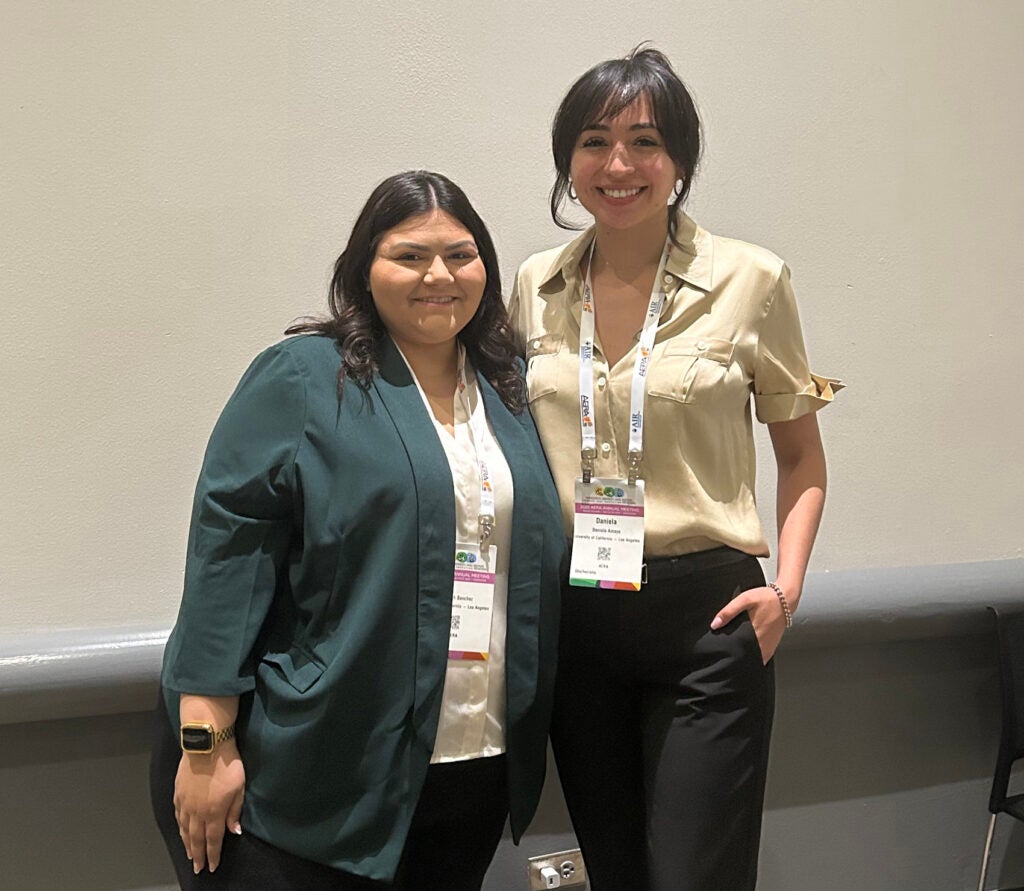
Stanley Johnson, senior project scientist, UCLA Center for the Transformation of Schools (CTS), presented his paper, “Impacts on K-12 Student Experiences and Outcomes,” in a symposium titled, “The Power of Community: Researching Transformation by Remedying and Repairing Teacher Education,” chaired by Professor of Education and CTS director Tyrone Howard. Kai Monet Mathews, executive director of the Urban Ed Academy, served as discussant.
Johnson’s study is grounded in the growing body of research demonstrating the positive impacts of teacher diversity on student outcomes, suggesting that students, particularly those from marginalized backgrounds, benefit academically and socio-emotionally from having teachers who share their racial or ethnic identities. Drawing from critical race theory, his research posits that racial and ethnic diversity among educators can challenge systemic inequities and provide culturally affirming experiences for students of color, and provides empirical evidence in support of diversifying the teacher workforce and implementing culturally responsive practices, with positive effects on student achievement, engagement, and well-being, as well as informing both policy decisions and instructional practices in K-12 education.
“I would want people to understand that given the issues that are happening with anti-DEI, to me it is an American problem,” said Johnson. “We cannot have any form of discrimination [and] we want to make sure that we have a generation that can support the needs of our students and families.”
Kai Monet Mathews, discussant for Johnson’s session, said that his presentation encapsulated, “… how we come together as different institutional entities that are preparing teachers and also supporting students, in order to make an ecosystem that is caring … liberating and uplifting for everyone involved, teachers, students, and staff included.
“The very technical work of partnering with universities and school districts and changing and redesigning our curriculum, and focusing on the process by which we prepare teachers, is important in terms of developing an entire pipeline that retains teachers but is also transformative,” said Mathews.
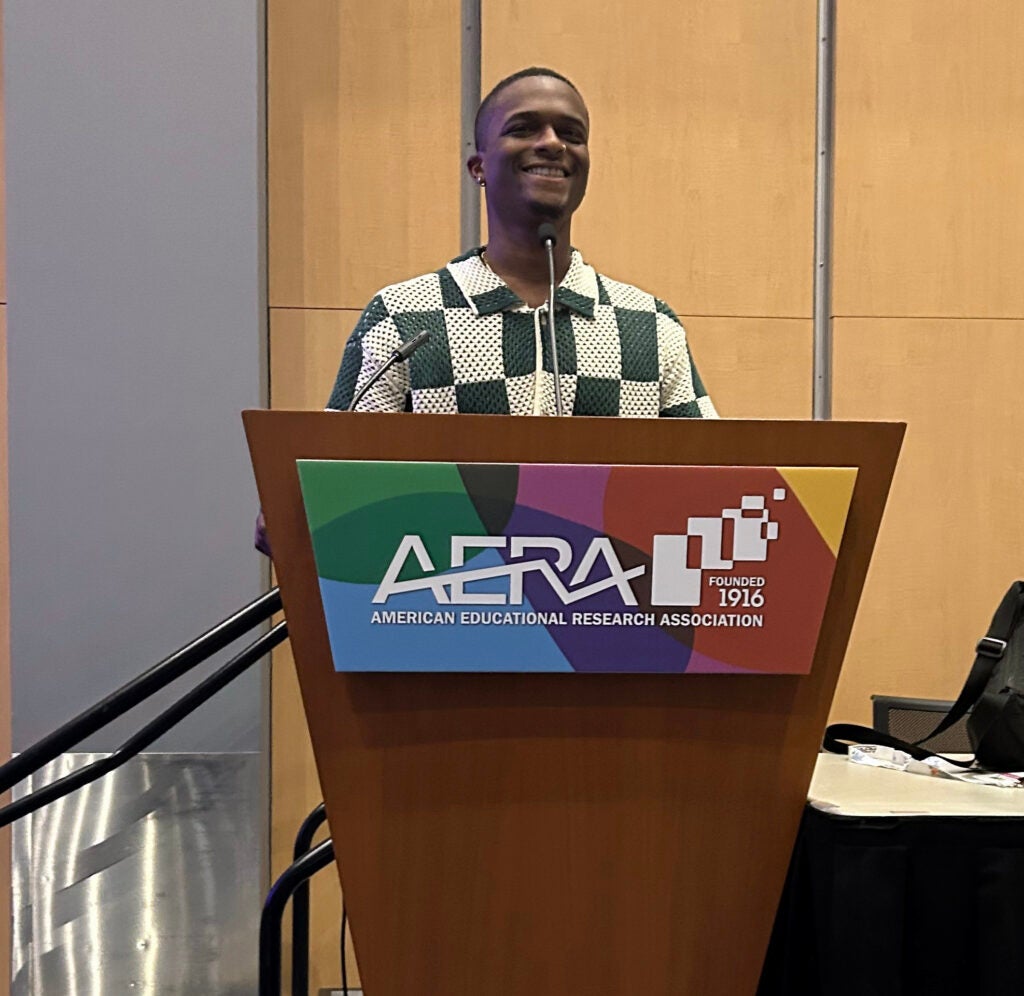
Doctoral student Gene McAdoo presented a “Push/Pull Paper Presentation on Proposed Remedies” in an invited speaker session on, “The Subject at Large: Regenerating Theory and Practices in Black “Male” Educational Research,” chaired by Professor Howard.
McAdoo’s work focused on the myriad interrelated crises around the COVID-19 pandemic that have spurred unprecedented advances in contemporary medical knowledge but have not addressed the continual health disparities among Black people, including higher rates of mental illness, disease diversity, and morbidity.
McAdoo said that his research reveals, “… [creating] liberatory educational spaces for Black males, especially with regard to gender and masculinity … that enable them to critique and refuse patriarchal masculinity in the ways that it causes harm for Black males and people in general.
“We aim to develop educational spaces, allowing men to interrogate themselves and their identities, and the ways that we are taught to be men that are harmful,” he said. “We need to be able to critique it and refuse it, and try to think about how we can live in healthier ways.”
Laura Chavez-Moreno, assistant professor of education and Chicana/o & Central American studies at UCLA, shared her research on, “How Schools Make Race: Latinx Racialization in Bilingual Education,” during a symposium on, “Racial Justice in Multilingual Education: What Is It and How Do We Realize It?” Chavez-Moreno’s work is the basis for her book, “How Schools Make Race: Teaching Latinx Racialization in America,” which won the 2025 Early Career Book of the Year from the American Association of Hispanics in Higher Education.”
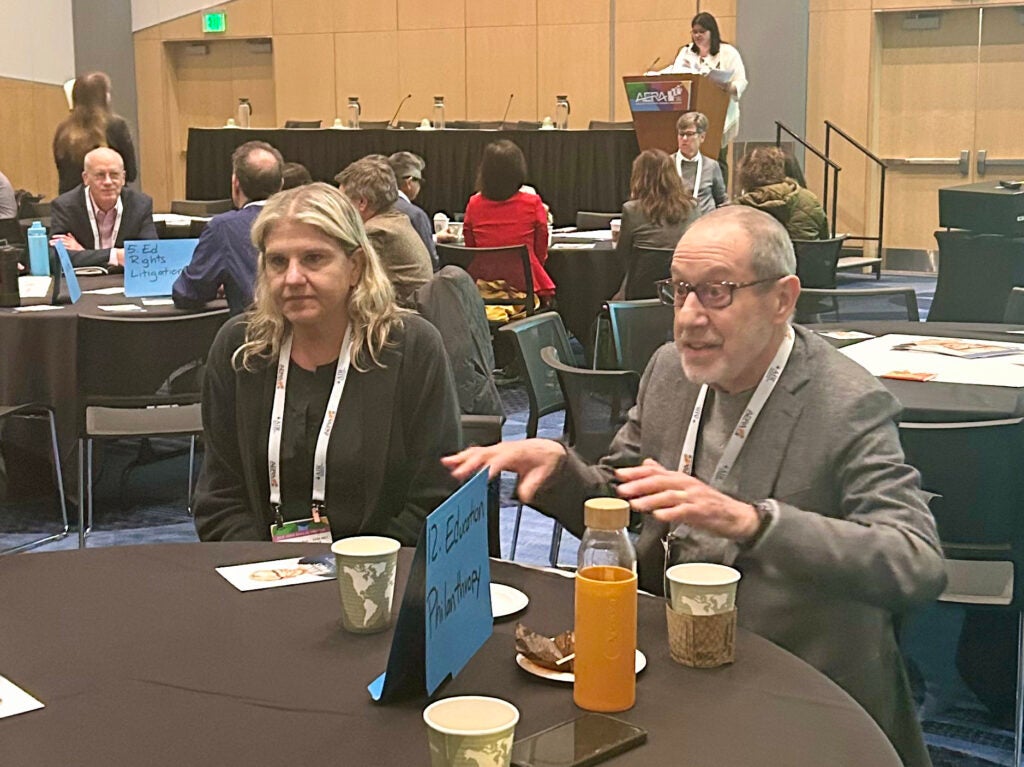
A most significant event for UCLA Education was “A World Café Honoring the Legacy of Jeannie Oakes,” a symposium honoring the late UCLA presidential professor emerita in educational equity. A dozen roundtable discussions memorialized Oakes and her groundbreaking work in critical topics in education, including teacher education, public scholarship, and detracking. The conversations also explored aspects of Oakes’ work that most urgently need to be brought into the future. Martin Lipton, Jeannie Oakes’ husband and her co-author for “Becoming Good American Schools: The Struggle for Virtue in Education Reform,” “Making the Best of Schools,” and “Teaching to Change the World,” served as one of three co-chairs for the session.
Oakes’ impact on UCLA’s scholarship was evidenced in the papers, “Broad and Rich Learning Opportunities” by Marisa Saunders, director of research at the UCLA Center for Community Schooling; and Anne Stanton of Linked Learning Alliance; “Teacher Education” Jody Priselac, adjunct professor emerita, Megan Franke, professor of education and vice chair of professional programs; and Jamy Stillman of the University of Colorado-Boulder. UCLA Professor of Education John Rogers, who co-authored “Learning Power: Organizing for Education and Justice” with Oakes, presented “University Research Centers to Make a Difference,” with Makeba Jones of UC San Diego, as well as “Education Indicators” with Siomara Valladares of the University of Colorado. “Grassroots Youth and Community Organizing” was shared by Veronica Terriquez, professor of Chicana/o and Central American studies and urban planning at the UCLA Luskin School of Public Affairs; and Ana Carolina Fernandes de Bessa Antunes of the University of Utah.
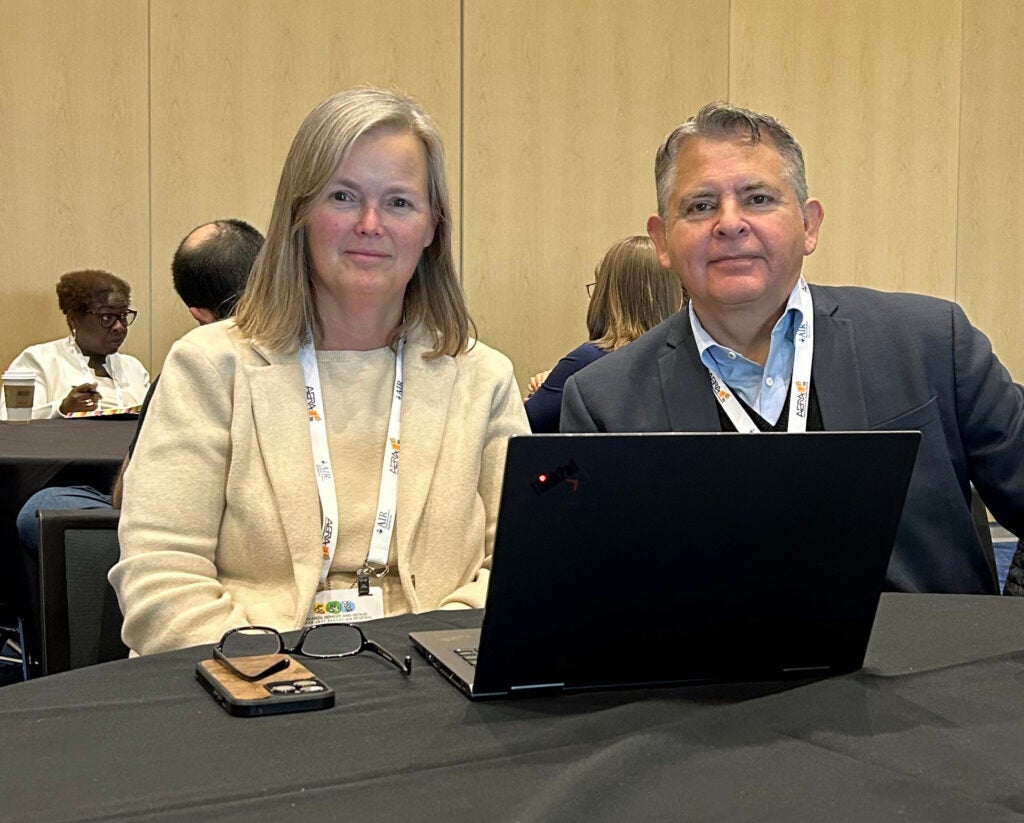
“Technical, Political and Normative Dimensions of Equitable Reform” was presented by Professor of Education Robert Cooper, co-faculty director of the UCLA Principal Leadership Institute and director of the UCLA Equity and Access Studies in Education Project; this year’s AERA President Janelle Scott of UC Berkeley; and Amanda Datnow of UC San Diego. In addition, seminal work on “Community Schools” was shared by Karen Hunter Quartz and Anna Maier of the Learning Policy Institute.
“This was about the extraordinary legacy of Jeannie Oakes, who was as some commented, not just a scholar, not just a teacher, but an organizer in the deepest sense,” said Professor Rogers, who with Oakes co-founded the UCLA Institute for Democracy, Education, & Access (IDEA) in 2000. “She brought people together from across different sectors: policymakers, young people, educators in the field; other scholars, philanthropists. She had them engage with one another in conversations about how our schools do not enact in justice now and what it would take for them to become more just and democratic spaces.
“All of these voices, all the people that came today were deeply touched by Jeannie’s life and want to carry that legacy forward,” said Rogers. “A key question today was, given all the threats to democracy, given all the threats to justice right now, how do we draw upon the love and wisdom of Jeannie Oakes to move towards a future that Jeannie would have [wanted].”
Above: Professor Cecilia Rios-Aguilar, chair of the UCLA Department of Education, chaired the event, “’Conviviendo por y con Luis C. Moll’ [Conviviality for and With Luis C. Moll]: Bridging Funds of Knowledge, Vygotsky, and Educational Equity,” honoring the late professor and researcher at the University of Arizona and his significant contributions to the field. Photo by John McDonald
Sunday, April 27
Jump to summary for Wednesday, April 23 | Thursday, April 24 | Friday, April 25 | Saturday, April 26 | Sunday, April 27
Professor of Education Tyrone Howard chaired the AERA Presidential Session, “The Academic Publishing and Peer Review Crisis: Remedy and Repair to Address Systemic Challenges and Inequities.” Cecilia Rios-Aguilar, professor and chair of the UCLA Department of Education, took part in the panel discussion, which focused on key aspects of academic publishing and peer review, including the pressure on scholars to produce at higher rates; burnout as professional demands in institutions increase; advances in AI that have affected research production and academic freedom; and the difficulty that journal editorial teams face in finding reviewers, which greatly delays publication.
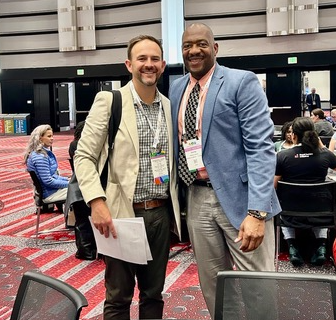
Teresa McCarty Distinguished Professor and George F. Kellner Chair of Education and Anthropology, took part in the symposium, “Indigenous Language Immersion and “Mainstream” Dual Language Bilingual Education Allyship: Learning From/With Each Other.” She presented “Bilingual Education for Indigenous Holistic Academic Resurgence and Renewal: Findings from the Indigenous-Language Immersion Study”with SEIS research professor Michael Seltzer and doctoral students Kyle Halle-Erby and Thomas Jacobson.
The team’s study examines the distinctive pedagogical features and outcomes of Indigenous-language immersion in relation to non-Indigenous bilingual education, and its effects of the loss of Indigenous language and continual education disparities. The discussion included the goals of contemporary Indigenous-language programs to reclaim ancestral languages and eliminate academic inequities.
“We want people to understand that Indigenous language immersion programs exist all over the country, all over the world actually, and that lots of experience from immersion Indigenous educators as well as the research we’ve been able to do… has shown tremendous and wide-ranging benefits of Indigenous language immersion for students, for languages, for communities,” said Jacobson. “The benefits are holistic. They encompass spiritual, academic, emotional, familial… pretty much every aspect of human wellbeing that one can imagine. We are seeing some remarkable effects in terms of the opportunities for students to learn and participate in these programs, and ways that Indigenous language immersion is remedying some of the harmful effects of colonial education systems.”
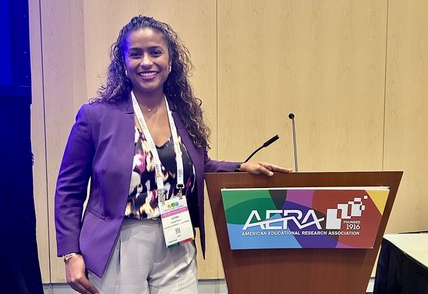
Joseph Bishop, executive director of the UCLA Center for the Transformation of Schools, and and Stanley Johnson, senior project scientist, presented their paper, “Incorporating the Social, Cultural, and Emotional Dimensions of Student Learning to Develop STEM-Identities in Computer Science” in a roundtable discussion on “Fostering Equity and Identity in Computer Science.” Their study explored how teachers’ pedagogical approaches can help prioritize the social and emotional dimensions of student learning to foster STEM identity and development, through five high-leverage instructional strategies, including teacher mindsets towards specific subject areas like computer science; creating conditions for the cultural affirmation of students; intentionally prioritizing student autonomy for social and emotional development; co-constructing knowledge to increase student engagement; and helping students create their own STEM identity by exposing them to STEM professionals of similar racial and cultural characteristics.
“In computer science education we’ve separated computer science and social and emotional development,” said Bishop. “We’re trying to integrate and bring those two pieces together. This is based on a study we did in South Los Angeles as part of a National Science Foundation grant, [studying] the attributes of teachers and how they interact with students over a three-year period.
“We found that the capacity of the teachers to build relationships and to give students freedom to learn and to co-learn with their fellow students … allowed the students not only to develop their interest in STEM and computer science specifically, but also to grow, socially and emotionally.”
Assistant Professor of Education Julissa Muniz served as discussant for the paper session on, “Making Sense of Youth Voice: Commenting on and Critiquing the Social Contexts of Schooling.”
Muniz said that the role of a discussant at AERA is key to encouraging new scholars and, “… is in many ways to uplift their work and engage them as thinkers as well as offer some insights on ways their work can develop. I think a discussant, in some ways, tries to provide insights and free feedback, which as a writer, sometimes you don’t always get.”
Assistant Professor of Environmental Justic Chris Jadallah presented the paper, “Building River Futures Through Art and Advocacy,” with doctoral student Jackson Gzehoviak in a symposium titled, “United We Stand: Interdisciplinarity and Progressive Politics in Pre-K–12 Classrooms, Communities, and Curriculum.” Their paper illustrated one of four projects where the authors delineated how mobilizing interdisciplinarity to engage with/in progressive politics afforded students of all age levels and their teachers a chance to challenge dominant (hi)stories, using arts, literacies, science, and social studies to cultivate alternative spaces for political action and to move toward more just social futures. The authors discussed their study of how youth participants took up strategies around historical inquiry, in–the–moment exploration, and future–oriented advocacy around the Los Angeles River, focusing on concerns about the impacts of green gentrification on their communities.
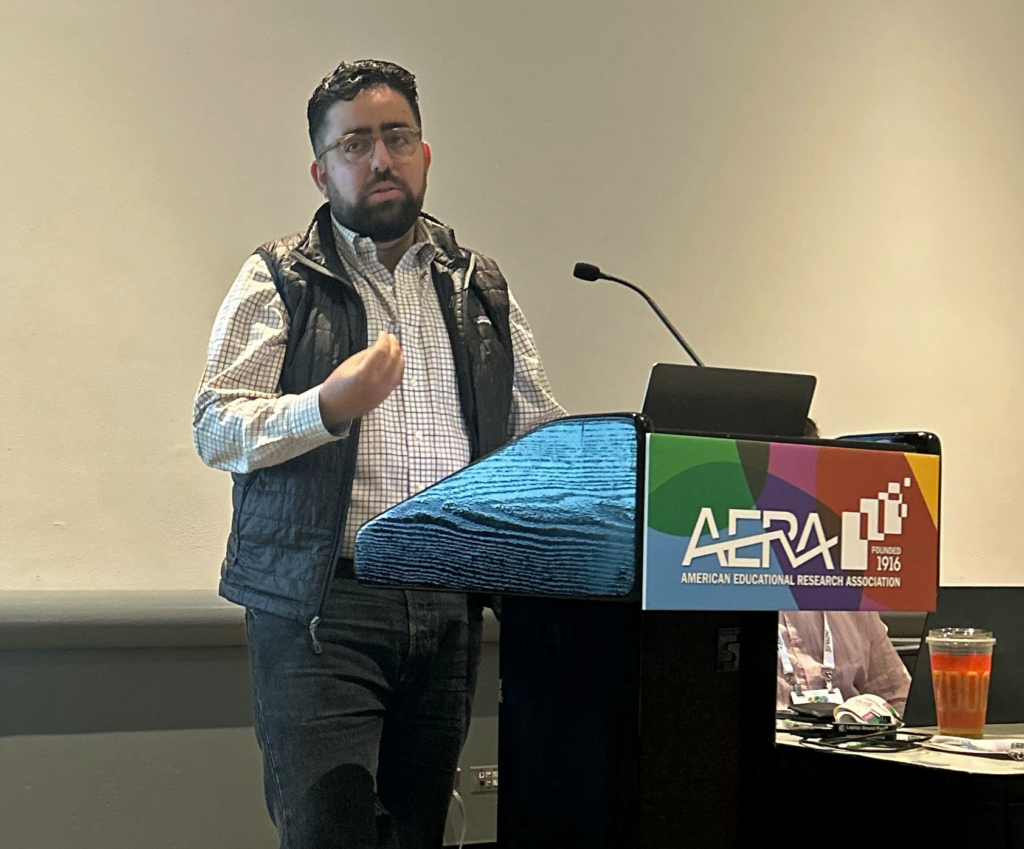
Professor Jadallah noted, “the importance of transdisciplinarity as a design principle for how we organize teaching and learning to support young people in making socio-ecological change in their community [with] opportunities to engage in identity work; [exploring] the histories of their neighborhood; and … [articulating] new visions for their neighborhood.
“When young people are afforded the opportunity to draw on different disciplinary ways of knowing; to draw on their own ways of knowing; and to really bring together and leverage different kinds of knowledges, they’re able to generate creative and brilliant solutions to environmental problems, and then start to take action toward building different kinds of environmental futures in places like Los Angeles, where that work is really necessary,” said Professor Jadallah.
Joanie Harmon contributed to this article.
